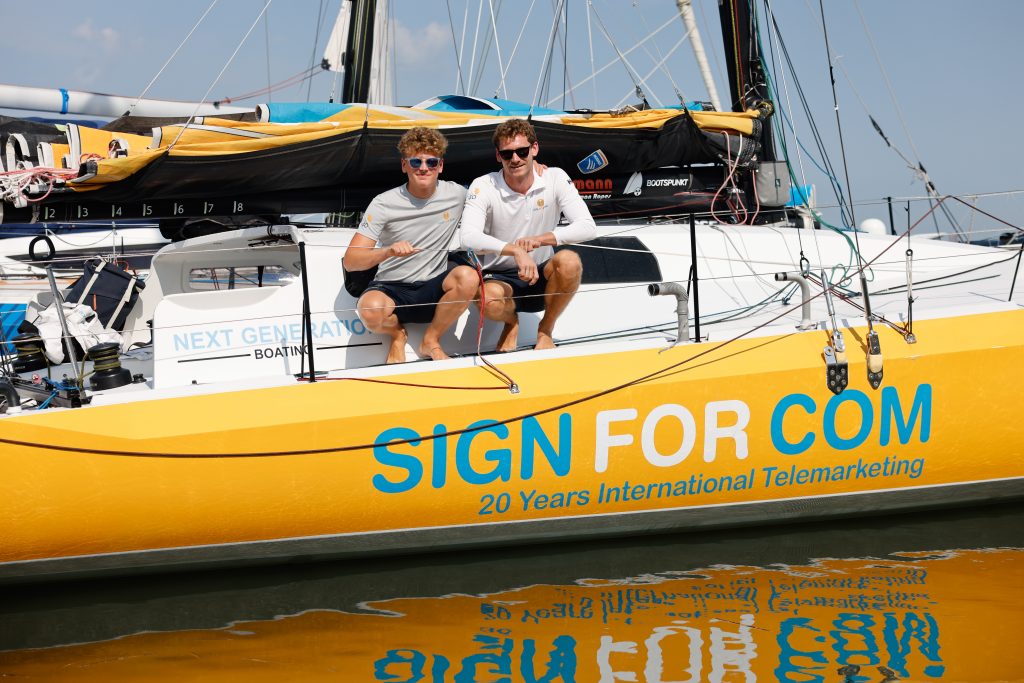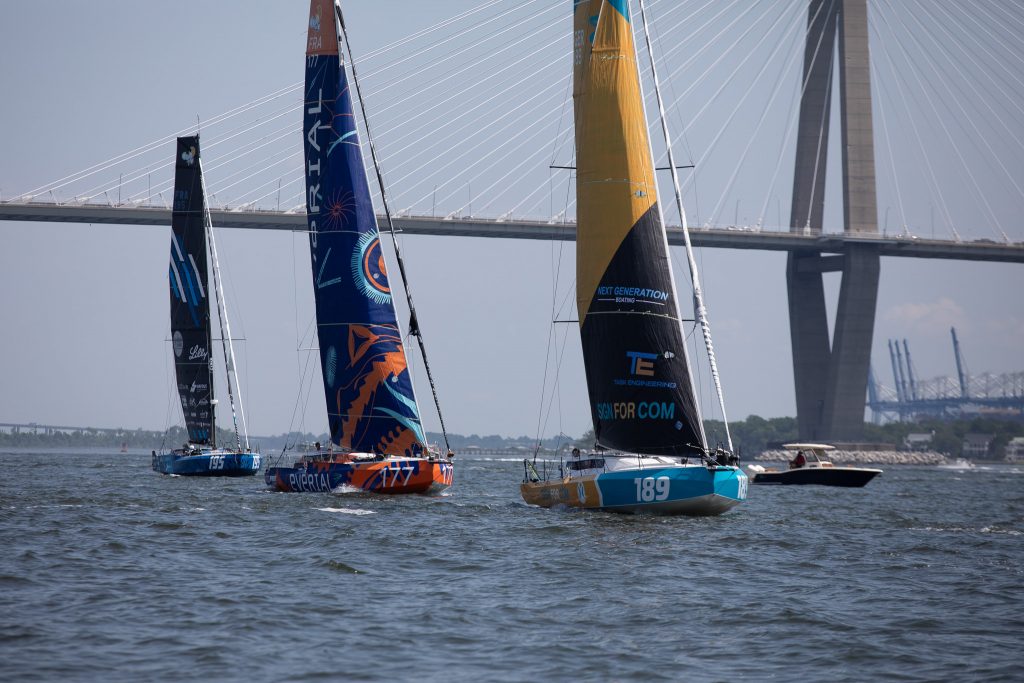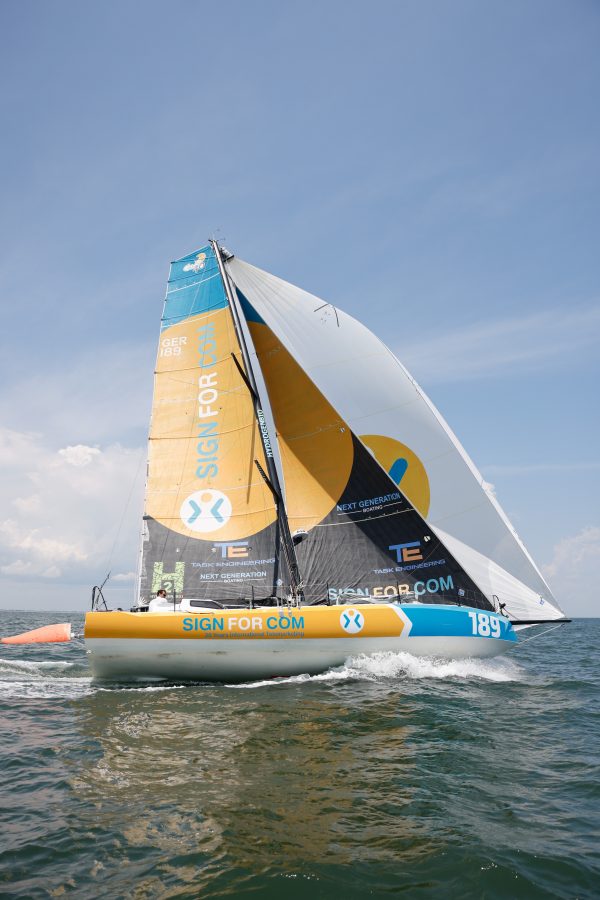It’s not often you run into two guys in their early twenties who have already racked up some serious performance credentials in the sharp-elbowed world of professional offshore solo sailing. German sailors Lennart Burke and Melwin Fink are two such characters. I spoke with them at Safe Harbor Newport Shipyard during the Newport stop of The Atlantic Cup.

Pictured before the start of the 2024 Atlantic Cup, Melwin Fink (left) and Lennart Burke finished 4th in the Rolex Fastnet Race and 15th in the 2023 Transat Jacques Vabre. © Billy Black
Coop: Guys, congratulations on your third-place finish in Leg 1. You must be pretty happy with that…
Lennart Burke: Yes, that was a good result, against the strong French sailors.
Coop: I just want to get a bit of back story to you guys. Was sailing “a thing” in your childhoods?
LB: I started sailing when I was ten, and sailed Optimists and 420s in primary and high school. Then I did a lot of Melges 24 sailing. When I was nineteen, a couple of friends and I bought an old boat, fixed it up and cruised around the Atlantic for a while.
Melwin Fink: I have been sailing since I was five. My family had a boat on the Baltic Sea, where we always spend our holidays. I am not from the seaside – I’m from the west/middle of Germany. I too then started with Optis but I was not much interested in dinghies. I found the Mini class, and had my first Mini when I was seventeen. We both did the Mini Transat in 2021, sailing the Pogo 3.
LB: Yes, we were just two crazy young guys, living in a van and sailing!
Coop: Yes, I saw that one of the guys who works for you lives in a van. Must be the Cole Brauer thing, eh?
Both: Yes, this it is how it is. We spent two years in our vans.
Coop: I looked at your website, Next Generation Boatbuilding. How did that come about?
LB: After the Mini-Transat and developing a client roster for our preparing and coaching services, we started the Shipyard and now we have seven people working for us.
MF: There are not many professional sailors in Germany or ways for normal sailors to make their boats better, so we used our professional experiences preparing and racing Minis to make a business doing the same for regular sailors.
Coop: Yeah, you two and Boris (Hermann). What is the business? Building fast boats, or…?
Both: Mainly making modifications with rigging, block locations, and small things to make the boats easier to sail. Also preparing the bottom, doing optimization refits, and delivering the boat to and from regattas. We have a sailmaker in the business too, so we can provide sails. We help manage the campaigns, and advise on what races are good to do We can have our guys come to the boat to optimize it, then we go and do coaching and training with the crew, all to optimize what is there.

Sign for Com leads the fleet out of Charleston. © Billy Black
Coop: Are your clients “normal” 9 to 5 working guys who race on the weekend at the yacht club?
MF: Yes. They have nice performance cruisers or fast boats and they like to do well, but don’t usually have the time or skills to build a campaign. We can tell them what they need, and often what they don’t need…
Coop: (Chuckle) Yeah, “Do you really need that complete engine overhaul toolbox…?”
LB: Yes, like that. We help with what is needed to make the boat fast, then help them sail it fast. It’s all about the preparation, and what they need.
Coop: So, no actual boat building?
LB: We can build a boat, but actually we have the hulls built by a firm in Poland who specialize in high performance composites.
MF: We get the hull and do what we know, including layouts and performance on deck areas. Building high level composites is a very specialized area, so we stick to what we know. And our Class40 is our business card. People see that is [Very well] prepared, clean and tidy, and how we do with it, and that is good advertisement for us.
LB: We have the boat always in the best condition and we do not break many things in the races, and that shows our skills at preparing a boat. So, all these things are a good business card.
Coop: I am getting the sense neither of you went to university for a “formal” education… (Both laugh)

Flying toward a podium finish in Leg 1 © Billy Black
MF: Well, I went to a sort of technical school for Law, but I did not stay with it. I had no technical training for sailing. Then sailing became more and more professional, and I started learning as I went.
LB: Nothing for me. I left high school and sailed around the Atlantic with a friend from school. No university – I need to sail. After that I started my Mini project, and I learned everything doing that.
(Both speaking, overlapping each other): Doing your own project, you do everything: builder, marketing, finding sponsors, good at communications, preparer, technical guy, composites, ropes, electronics, doing events, speaking…everything.
LB: There was no time for education. Our company is our education.
Coop: How did you lay out and present your sponsorship proposals for your Minis?
(Again both overlapping): We tried to sell the adventure. You know, two young guys with massive goals, being motivated to reach them.
LB: No one could imagine two young guys, like Melwin, 17 years old, sailing a 6.5-meter boat across the Atlantic, alone, versus ninety or so other boats and sailors. Some Germans have participated in the Mini Transat, but they were older – forties and fifties – and not professionals. They stop their lives for two years, then go back to them.
MF: We absolutely dedicated everything to the Mini. Two years in France training, working on the boats, doing races to qualify, and getting experience. It worked very well, and the sponsor liked it. My Mini sponsor, Sign for Com, is now sponsoring our Class40 program.
Coop: And Lennart? Who was your sponsor and how did they like it?
LB: My sponsor was a regional bank where I am from. The bank was really promoting the region and wanted to expand its exposure further around the region, which we did. And it was only in that region – nothing national or outside that region. In the regional press and regional companies, it worked really, really well. When the governor of the region agreed to the project, he stood next to me and said, “I am supporting this project and helping them,” and many other companies came with us to support the project.
Coop: Well guys, I could do this all day long, but unfortunately, I must go to the day job. Thanks for taking the time from preparing the boat. Good luck with the next leg, and into the future.
Both: Thanks for the opportunity, Coop! ■




